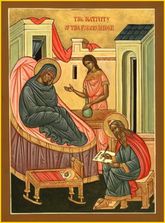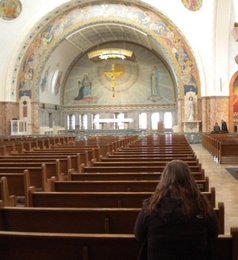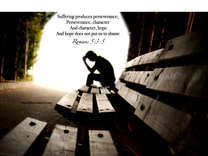 Some days in the Church calendar give me pause. I don’t know about you, but the meanings of all our solemnities, feasts, and memorials aren’t always clear. It’s hard enough to understand the holy days of obligation, let alone all the non-required celebrations. Some days the logic of the Church is clear, but on others, when I look at the upcoming feasts, I stop to wonder what the heck the Church was thinking. Yesterday’s celebration – The Nativity of John the Baptist – has always been curious to me. Admittedly, I’m too literal. In most questions of faith, that is my problem from the outset. I see what’s on the surface – the name, date, or historical information – and am blind to the depth of what is revealed below the surface. Often, my faith needs help. It needs a rock tumbler of sorts. You know those machines that take ordinary rocks and spin them around until their edges are smooth and their inner colors radiant? They turn the plainest rocks into gems. Growing up, a kid in your neighborhood probably had one, and, if you were as nerdy as me, you thought it was pretty cool. Sometimes, like with the Solemnity of the Nativity of John the Baptist (and other churchy sounding things), I need a rock tumbler for faith. Luckily, I have one. Let me walk you through how it works. At first, I hear something about the Church (teaching, feast day, tradition, ritual, etc.) and think “that’s weird, why do we do that?” Then my literal brain tries to explain it. Example: when I think of John the Baptist’s birth (JB for short), it doesn’t strike me as his most shining moment. Yes, it’s biblical and had some impressive in utero gymnastics and marital muteness (what wife doesn’t wish her husband speechless every so often, right?). But, at the same time, JB’s birth plays second fiddle to his ministry, to his baptizing. We don’t call JB “the Baptist” by mistake. JB’s ministry makes it into all four gospels, his death in three, but in only one gospel (Luke) do we hear of his birth. The faith tumbler is usually loud at first and produces few obvious results, as you can see. Generally, when this tumbling process begins it doesn’t cue me in that it’s started. Rather, I mistake the noise of the faith tumbler for my own frustration and keep searching for some literal satisfaction. After my biblical strikeout, I dive headfirst into history. The fact that we don’t actually know JB’s birthdate doesn’t surprise me, but when I start finding evidence that Luke’s account of JB’s birth is more likely a construction of scriptural allusions (not illusions) than it is historical fact, my mind starts spinning even more. Thank God, after long enough, my frustration mounts and I give up. I let go. I get frustrated with the Church and wonder: Why they don’t they just stick to Jesus and forget all these other nonessential feasts? They’re unneeded, a historical (some, not all), and it’s just mixing up the Gospel message… That’s when it hits me. The sharp edges of my literalness soften. The walls of my attitude give way. The roughhewn rock of my faith vanishes and its inner colors come forth. I see what was there from the very beginning and what will be there until the end of time. The Solemnity of the Nativity of John the Baptist is not just about John the Baptist; it isn’t just about history or allusion or mistaken priority either. It’s about today and it’s about Jesus’ coming. It’s about us and the fulfillment of the kingdom now. Did you hear that beep? That was the faith tumbler. Its cycle is finished and I’m lucky for it. Mark Bartholet is the Pastoral Associate for Faith Formation at St. Peter Catholic Church in Charlotte, NC.
0 Comments
The following is a portion of Blessed John Paul II’s address to the Pallottine Fathers and Brothers on
October 6, 1998, speaking to them about their work in reviving faith, rekindling charity and forming apostles. …To live the faith means to share in Christ's life. In Jesus we can discover our true nature and fully appreciate our personal dignity. Proclaiming Christ so that the image of God may be restored to each person in all its fullness is the ultimate goal of the “new evangelization”. You, called in a particular way by your charism to revive faith and rekindle love in every situation, should be very clearly aware of the preferential option for the “image of God” that is waiting to be revealed in the life of every brother and sister. Recognize Christ’s face in everyone, appreciating every human being regardless of his condition or status. This is what St Vincent Pallotti did, whose sole concern was the interior renewal of human beings for the sake of their sanctification. To imitate his apostolic zeal, you must first strive for personal holiness. Only in this way will you be able to foster it in others, by remembering the universal call to holiness clearly made by the Second Vatican Council. It is this awareness that must motivate your contribution to the work of the new evangelization. In this way you will be effectively prepared to enter the new millennium and will actively co-operate in fulfilling the mission that the Father of our Lord Jesus Christ entrusted to the entire ecclesial community. The commitment to personal holiness must be lived within your communities in the various parts of the world: work in unity and harmony to be authentic witnesses to the Gospel for those you meet in your daily ministry. In the Apostolic Exhortation Vita consecrata I wrote: “The Church entrusts to communities of consecrated life the particular task of spreading the spirituality of communion, first of all in their internal life and then in the ecclesial community, and even beyond its boundaries, by opening or continuing a dialogue in charity, especially where today’s world is torn apart by ethnic hatred or senseless violence” (n. 51). It is by witnessing to the fraternal life, understood as a life shared in love, that you become an eloquent sign of ecclesial communion (cf. ibid., n. 42). This deep understanding among yourselves will help you live your “unity in Christ” and make you ready and willing to respond to each person’s spiritual and material needs. In this regard your founder loved to say over and over that “the gift of cooperating in the salvation of souls is one of the most divine” (Opere complete XI, p. 257). This gift should be shared with lay people, your daily co-workers in the apostolate, as well as within your institute. Involve them and welcome them into your life of communion. “Today”, I wrote in the above-mentioned Apostolic Exhortation Vita consecrata “many institutes have come to the conclusion that their charism can be shared with the laity” (n. 54). “The participation of the laity often brings unexpected and rich insights into certain aspects of the charism, leading to a more spiritual interpretation of it and helping to draw from it directions for new activities in the apostolate” (n. 55). In this way, the Society of the Catholic Apostolate, conceived and founded by St Vincent Pallotti, will allow you not only to co-ordinate the different resources of your communities, but also to be at the very heart of the Church’s apostolic mission in today's world. May you find help in Mary, faithful and obedient handmaid of the Lord and an excellent example of fidelity to the apostolate. United in prayer with the disciples in the Upper Room of Jerusalem while awaiting the gift of the Holy Spirit, she offers you the example of constant prayer, willingness and active commitment to the Church’s mission. May God renew the marvels of Pentecost in you and in your institute through her motherly intercession… As I settle into my second year at a parish in South Jersey, and find myself responsible for the entirety of programs like First Eucharist preparation and family ministry, I’ve noticed that I must also find my own solution to a continual tension involved in running such programs. I’m calling it “the tension between the urgent and the important.”
There’s a sense of being bogged down by stuff that isn’t important in itself, but is necessary for the important stuff to happen. I don’t want to focus all my sacramental preparation time on ensuring the kids all have baptismal records; I want to make sure we have a coherent plan for how we’re forming them after baptism. I have to be able to find time to look beyond these minor concerns (even if I can’t move on without them) to notice and evaluate where the parish is headed in our ministry, and if that ministry really is allowing Christ to change hearts. Different personalities will use different strategies for managing this tension, so I can’t offer much of an explicit road map. However, we can all agree - it must be managed. If we don’t make time for the visionary in our ministries, we never move forward towards the vision. I understand that this year’s ministry won’t quite comprise the full realization of our eschatological hope, but I’m also in my last year at this parish, and I don’t want to accept continually the deferment, “Next year, we can actually catechize well.” As I contemplated this professional frustration, I realized there was an analogous tension in my life: contemplative prayer. I’ve often heard cited that “finding the time to pray” is difficult, but each of us needs to take a good hard look at what exactly are the things which supercede our prayer lives. As a parish minister, mine are especially ironic - “I can’t pray now, I have to get to work... so that I can balance envisioning the direction of the Church with executing the logistics involved.” I may be well-intentioned, but that prioritization isn’t ultimately fruitful. I cannot say that I am doing the work of the Church, whether important or less important, if I am not also praying through the work of the Church. “Everyone of us needs half an hour of prayer each day," remarked St. Francis de Sales, "except when we are busy—then we need an hour." This pithy quote is a roadmap to balancing the tension between my active ministerial work and the vision, which in this case actually is the Kingdom of God. The Catechism also calls me out: “The choice of the time and duration of the prayer arises from a determined will, revealing the secrets of the heart. One does not undertake contemplative prayer only when one has the time: one makes time for the Lord, with the firm determination not to give up, no matter what trials and dryness one may encounter” (2710). Isn’t it ironic that the trial can be a temptation to plan out the best work of the Church? I have to be able to make (not “find”) time to look beyond my work (even if the Church couldn’t move on without it) to notice and evaluate where I’m headed in my prayer life, and if that prayer life really is allowing Christ to change hearts... especially my own. I don’t want to promise continually, “Tomorrow, I will actually pray well.” Laura Berlage serves as an Echo Faith Formation Apprentice in the Diocese of Camden, NJ “…we even boast of our afflictions, knowing that affliction produces endurance, and endurance, proven character, and proven character, hope, and hope does not disappoint, because the love of God has been poured out into our hearts through the Holy Spirit that has been given to us.” ~Romans 5:3-5
A few weeks ago, during our celebration of the Solemnity of the Most Holy Trinity, this portion of St. Paul’s letter to the Romans was read to faithful Catholics throughout the world. I had the privilege of attending a bilingual Mass that weekend with my girlfriend, Kara, in a high school gymnasium. The different setting, unfamiliar language, and unusually large number of altar servers hardly crossed my mind as we participated in Mass at Most Holy Trinity Parish, on this, their solemnity. It was a beautiful liturgy to say the least! What struck Kara and me most about our experience, however, were these lines from the second reading: How many of us know someone who is afflicted? We all have family members, friends or colleagues that are struggling with cancer, unemployment, depression, etc. In the daily news - local, national and international - we hear about gun violence, war, natural disaster, and famine. Even more simplistically, we each have ‘good days’ and ‘bad days.’ St. Paul reminds us that affliction is not something to run from because ultimately, we “boast in hope of the Glory of God” (Romans 5:2). His ‘flow chart of hope’ is a reassuring message of what true faithfulness yields and how God makes His love present to each of us in our struggles. The alternatives to hope (sin, despair, discouragement, impatience, fear, anxiety, guilt…)_ when left unchecked, are a rejection of God’s invitation to deeper communion with Him. Very basically, this reading offers us a roadmap to understand how affliction does not have the final word; hope does! Pope Benedict XVI’s homily at Nationals Stadium during his 2008 Apostolic Visit to the United States speaks to this point: “It is a prayer of unfailing hope, but also one of patient endurance and, often, accompanied by suffering for the truth. Through this prayer, we share in the mystery of Christ’s own weakness and suffering, while trusting firmly in the victory of his Cross.” We are able to endure our own afflictions because of the hope promised to us by God. Pain, suffering, and struggle are not pleasant, especially when they are affecting someone we know and love. As people of faith, though, we believe God is with us, united in our affliction and made present to us in the love we experience. This faith, this hope, and this love, offer us momentary comfort and strength as we journey to the ultimate glory of complete communion with God. We have a common call to share this hope with those around us, especially with those who find it difficult to endure in times of struggle. This simple reminder of the universality of the Church also reminds us that through prayer, “we become capable of the great hope, and thus we become ministers of hope for others” (Spe Salvi, 34). And so, as we are confronted with affliction, our prayer should be one of hope. As others struggle with affliction, our response should be one of hope. And as we begin to question why affliction affects our lives, we must remember that affliction yields hope; hope in the love of God. “Hope, O my soul, hope. You know neither the day nor the hour. Watch carefully, for everything passes quickly, even though your impatience makes doubtful what is certain, and turns a very short time into a long one. Dream that the more you struggle, the more you prove the love that you bear your God, and the more you will rejoice one day with your Beloved, in a happiness and rapture that can never end.” St. Teresa of Avila, The Exclamations of the Soul to God, 15:3. Jonathan Jerome is the Director of Catholic Campus Ministry at the University of Pittsburgh Johnstown. “I don’t want to grow anymore.” This cantankerous proclamation has lately become my state of being. It sums up my exhausted emotions as I finish a two year service program, study for my comprehensive exams, move back into my Mom’s house and struggle to land a job. In grumbling to my program director that Growing up is hard and I don’t want to do it, she shared with me a piece of wisdom: “You are never done growing and you are never done with being challenged. In the growing and in the challenge you come to a deeper knowing of God.” While still dealing with the overwhelming idea of constantly growing, I have come to find truth in these words. I realized that not only is growing up hard, but being Catholic calls me to this constant growth- this constant conversion of heart!
Being Catholic calls me to encounter the messiness of challenges, the hardship of changes, and the realization that I will always be growing until I am with God. St. Augustine in his Confessions writes of this conflicted desire to want the virtues of God, yet not ready to struggle with the realities of attaining them. St. Augustine shares, “Give me Chastity, just not yet.” This is how I feel. I want holiness…just not yet do I want to have to confront the realities to attain it. I want to know God… but not deal with the messiness. I want to be filled with the Holy Spirit… but I don’t want to face the growth that the Spirit leads me to. Margaret Silf, in her book The Other Side of Chaos, writes, “But we will also take the journey in faith—not the kind of faith that knows all the answers and has mapped out the right and proper path, but the faith that says simply, “I don’t know, but I trust.” She goes on to say, “It matters that you are willing to open your heart to a wider, fuller reality, one in which over time, or perhaps beyond time, you will know that ultimately every painful harrowing of your life’s field, and every anxious tending of new and tender growth, are leading to a harvest that you can’t begin to imagine.” I try to know all the answers and map out all the “right” paths. I don’t know if I want to open my heart wider to a fuller reality. I want a plan, a job, certainty, etc. I want anything that will keep me from feeling these anxious and unsettling emotions of transition and change. Yet, as my spiritual director would say, that is not of God. God is in the messiness; he is in the hardship of leaving a place I have called home for two years. He is in the humbling action of moving back into my Mom’s home. He is found in the rejection letters coming in from jobs. There is no room for God and the work of the Spirit when I decide I know best and try to plan my path. So here I am, left with no other choice than to sit in the messiness of transition and chaos. My wanting to be with God and to know God has brought me here and it is here that I continue to learn to trust that He is with me. It may take many years, or my entire life, to see how this time led me closer to His will and to understand the need for restlessness and messiness. But, there is no doubt that by encountering the messiness and seeking God in it, I am growing in a way that will enable me to become the apostle He is calling me to be! So encounter your messiness, lean into your hardships, and know wherever you are God can be found. Pam Tremblay is the Blog Editor for the Catholic Apostolate Center. I try to make it to weekday mass before work. One day recently, father spoke of self-possession. “We must fully possess ourselves to fully give ourselves.” For me, these words could not ring more true.
My service year thus far has been one of immense growth, complete with intense growing pains (I went from 5’4” to nearly 5’9” in middle school and I remember complaining to my father how much my knees and legs were hurting). Until mass that day, I didn’t connect that I’ve been learning, trial-by-fire, the important relationship between self-possession and self-gift. With my job as case manager at a residential high school for emotionally disturbed teenage boys, I can’t afford to live a life of extremes. I know what it’s like to go to work with little sleep (awful), I know what it’s like to go to work unprepared (stressful) and I know what it’s like to go to work in a bad mood (disastrous). This year is a crash-course in how to be an adult – I cannot get away with the disorganization that characterized my life for three-and-a-half of my four years of college. Then, I lived only for myself. Now, I have a duty to my community and to my students. I live for nineteen wild teenage boys, and whether or not they see or appreciate it, I need to be at my best every minute that I am at work. Self-possession, or self-discipline, is an important skill I am trying to acquire for the sake of myself and those I serve. Social service is a field that demands one to continually give of oneself. You give your time and attention to students with issues like, “I have a toothache and my mom’s insurance card isn’t working, can you make me an appointment?” to “I feel abandoned by my family and don’t want to be in this place” to irate calls from parents, to surprise visits from state agencies.. One is constantly giving time and attention to all types of people and situations. Self-discipline may have too much of an ascetic, medieval tone to it, but it is so very important for good work. I need to sleep. I need to smile and listen to others even when I don’t feel like smiling or listening. I need to do my paperwork in a timely manner. I need to read my work email instead of browsing the internet. I need to make sure I have time with friends so that I can be in a place of peace and happiness for my work. I need to model how to live a good life, so that when I give my students a hard time for playing 18 hours of video games over the weekend or for not communicating respectfully with their parents, I am not picking out their splinter in their eyes while the plank is in my own. We learn more from what people do than what they say. Our world is inundated with words, most of them pretty useless. Actions are more powerful, and someone who does what he or she preaches is the kind of person I might stop and listen to. Our faith has the most beautiful image of love: Jesus on the cross. That example of pure love, of most unselfish self-gift, moves me to action more profoundly than any words of a thoughtful hallmark card, any viewing of the Notebook, any poem of Elizabeth Barrett Browning (and I enjoy EBB!). Love in our faith is a dying to oneself for the sake of others and God. If I fully possess myself, I have grown in my ability to die constantly to myself. And if I have created that habit within, then I can more freely love and give to those around me. By Jen Coe, Lasallian Volunteer 12-13 Place of Service: Martin De Porres, Queens, NY This post was originally written and posted on the Catholic Volunteer Network Blog. For more Catholic Volunteer Blog Posts please visit the CVN Blog Page. The Catholic Apostolate Center is proud to partner with the Catholic Volunteer Network by developing faith formation resources for volunteers and alumni, assisting in its efforts to provide and advocate for faith-based volunteerism and collaborate in many additional ways. It has been about a year since I told my students that I would not be returning as their Religion teacher. I decided that I was moving back to Los Angeles at the end of the school year. I wanted to be back with my family especially my mom and two young nieces. I was burned out from teaching. And perhaps most importantly-I wanted to travel and explore the world. I wanted to do and achieve great and glorious things. At 25 years old, I was incredibly restless with my life.
At the beginning of his Confessions, St. Augustine writes his most famous and oft-quoted line: “For You have made us for Yourself, and our hearts are restless until they rest in you.” Throughout the first ever spiritual autobiography, Augustine bares his soul for God and for generations of people to read and understand. As a young man and even probably as an old Bishop, Augustine was a restless man searching and struggling for salvation. He was lonely and frustrated. He sought material goods and earthly pleasures. Yet it was not until he accepted God-rested in God-that he found peace. As I began to plan my travels, I remained open to any opportunity that would come before me. All I knew was that I wanted to see as many diverse places as possible and I wanted to do as many exciting things as possible. Thus, I hiked the 42 km Inca trail over four days to see Machu Picchu. I prayed at the Western Wall and knelt at the site of the Crucifixion. I saw my beloved Notre Dame get demolished in the National Championship game. I toured the White House and became breathless at the site of the Oval Office. I went on a medical mission in India and volunteered in various villages. I fulfilled “bucket list” places to see such as the Taj Mahal, Petra, and the Pyramids. It was an incredible blessing to be able to see and experience all these places, meet interesting people, and create such lasting stories and memories. However, I did not find the peace that I was searching for in my journeys. I sought it, prayed for it, and longed for it. And yet, it was not there. Despite all the miles I flew and the cool photos I took with Instagram, my heart was not at rest. Or at least not the rest I was hoping for. Nevertheless, when I look back on this year off, I notice the times that I felt at most peace were the days I spent with my nieces, Stella and Lauren. Stella is 3 and is incredibly precocious; she speaks both Korean and English, lectures us on how to listen better, and sings beautifully. Lauren is 1 and there is nothing in the world like her smile and her laugh. It has given me such immense joy to be with them, hold them, play with them-a joy that surprised me and builds upon itself. Seeing these two girls grow up and being present to them in very ordinary ways has given me peace that all the extraordinary sights in the world could not. When she read Confessions, my mom commented that St. Augustine and I shared some traits in common. We both love public speaking. We both have strong mothers who worry about them. And we both have a “healthy” amount of “confidence”-to put it lightly. All I can hope is that I find the rest in God that he pursued and ultimately found. Tae Kang has his MA in Theology from The University of Notre Dame through the Echo Faith Formation Program and has worked both as a Lay Ecclesial Minister in a Parish and as a High School Religion Teacher. |
Details
Archives
July 2024
Categories
All
|
About |
Media |
© COPYRIGHT 2024 | ALL RIGHTS RESERVED







 RSS Feed
RSS Feed